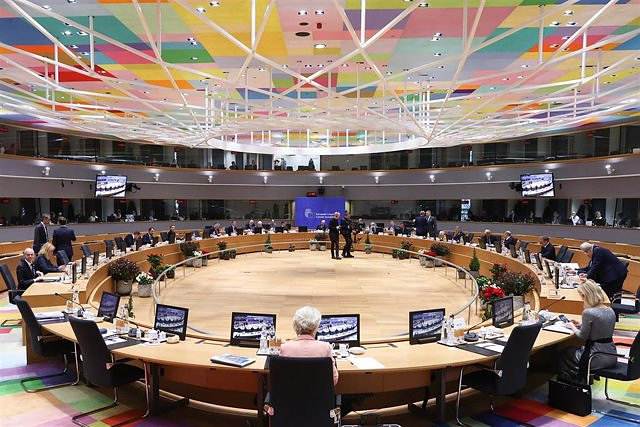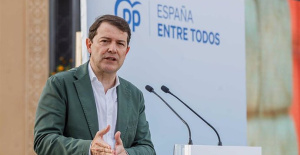The leaders of the European Union agreed this Thursday to open accession negotiations with Ukraine and Moldova, without the support of Hungary, whose Prime Minister, Viktor Orbán, has been absent from the room in a maneuver agreed with the rest of the heads of state and of Government that has allowed the approval of the decision that the other 26 Member States did support.
In a message on social networks, the president of the European Council, Charles Michel, has confirmed the 'green light' to open accession talks for Ukraine and Moldova, while Georgia has received candidate status to enter the bloc. Finally, the meeting has forged, without Hungary, the commitment to open negotiations with kyiv, thus following the recommendation of the European Commission that pointed in this direction.
"It is a powerful political signal to tell Ukraine that we are at its side and it is important for the credibility of the EU," Michel explained a few minutes later, in informal statements to journalists gathered at the Council headquarters to follow the summit.
In the conclusions of the meeting, the leaders invite the Council to adopt the respective negotiating frameworks with Ukraine and Moldova, once the relevant steps set out in the recommendations of the European Commission have been completed.
Regarding Bosnia and Herzegovina, European leaders have agreed to open negotiations once there is the necessary degree of compliance with the integration criteria set by the European Commission and will study a report from Brussels next March.
The Hungarian Prime Minister has been absent from the room to not vote in favor of the step with Ukraine and Moldova and, in this way, the EU has saved the consensus required to make the decision, while Budapest insists on its opposition to membership. "Hungary does not want to participate in a bad decision," the Magyar leader explained in a video on social networks.
Orbán arrived at the summit in Brussels rejecting all measures of military and financial support for kyiv, in addition to the decision itself to open negotiations. "It makes no sense, it is irrational and a wrong decision to start negotiations with Ukraine under these circumstances. Hungary's position will not change," he noted about the decision taken by the EU.
In any case, this is only the first step to begin discussing the entry of Kiev and Chisinau into the EU, since formal negotiations do not start until all EU governments agree, again unanimously, on a framework or mandate. for negotiations with the candidate country. In fact, Hungary already warns that this Thursday's decision is provisional and the Member States will have to unanimously agree on "the specific negotiation package" and during the negotiation process "at least 70 unanimous decisions" will be needed.
The summit before Christmas was called to take the step with Ukraine and Moldova. Both countries applied to join the EU following the Russian attack on Ukraine in February 2022. Kiev and Chisinau received candidate status just four months later in June, when it set some priority reforms to give the 'green light' to negotiations. of accession.
Until the very beginning of the summit, Orbán insisted on his blocking position, alleging the reforms that the European Commission placed as a priority. "We have set seven conditions and the Commission's own assessment is that three of the seven have not been completed, so it makes no sense for us to negotiate," argued the Magyar leader upon his arrival at the meeting of European leaders.
A "HISTORIC" DAY
The first reactions to the decision of the European Council have come through the social network that they have celebrated with "pride".
The president of the European Commission, Ursula von der Leyen, has highlighted in a message on the social network proud" that the Union has kept its promises and "satisfied" by its partners.
The president of the European Parliament, Roberta Metsola, has also received the news with "pride" for all those who fight for the values of the EU and who "look at Europe as a beacon of hope." "We have kept our promises. We have made history. Now we will write the future together," she added.
The High Representative for foreign policy of the EU, Josep Borrell, has stressed that the EU has taken a "historic" step towards a "stronger European family" and that the decision of the European Council is a "testimony of commitment and dedication" of partners to common values and EU reforms.
Meanwhile, the President of the Government, Pedro Sánchez, has pointed out that this is "a historic day for Europe" and has had a telephone conversation with the Ukrainian president, Volodimir Zelenski, to congratulate him on the decision taken. Sánchez congratulated Ukraine and Moldova on the Council's decision, which represents a first step towards their incorporation into the EU.
"It is a victory for the unity of the EU! Victory for all of Europe!" also celebrated the Lithuanian president, Gitanas Nauseda; while Estonian Prime Minister Kaja Kallas speaks of a "historic day!" in which the decision has been made to start accession negotiations with Ukraine and Moldova "against all odds".
His Latvian counterpart, Edgars Rinkevics, added that Ukraine, Moldova, Georgia, Bosnia and Herzegovina are "indispensable" parts of Europe and that they "deserve to live as free and democratic nations, and in peace!"

 Exploring Cardano: Inner Workings and Advantages of this Cryptocurrency
Exploring Cardano: Inner Workings and Advantages of this Cryptocurrency Seville.- Economy.- Innova.- STSA inaugurates its new painting and sealing hangar in San Pablo, for 18 million
Seville.- Economy.- Innova.- STSA inaugurates its new painting and sealing hangar in San Pablo, for 18 million Innova.- More than 300 volunteers join the Andalucía Compromiso Digital network in one month to facilitate access to ICT
Innova.- More than 300 volunteers join the Andalucía Compromiso Digital network in one month to facilitate access to ICT Innova.-AMP.- Ayesa acquires 51% of Sadiel, which will create new technological engineering products and expand markets
Innova.-AMP.- Ayesa acquires 51% of Sadiel, which will create new technological engineering products and expand markets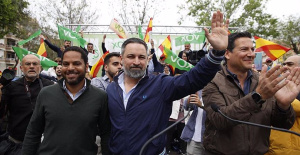 Abascal (Vox) criticizes that Sánchez is "victimizing" himself and calls for elections after his possible resignation
Abascal (Vox) criticizes that Sánchez is "victimizing" himself and calls for elections after his possible resignation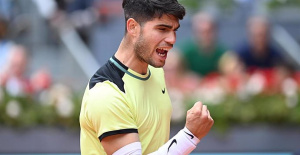 Carlos Alcaraz reaches the round of 16 in Madrid without breaking a sweat
Carlos Alcaraz reaches the round of 16 in Madrid without breaking a sweat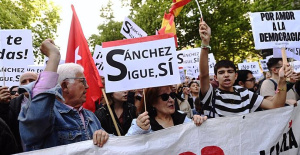 Some 5,000 people demonstrate in front of Congress for democracy, hours before Sánchez's decision
Some 5,000 people demonstrate in front of Congress for democracy, hours before Sánchez's decision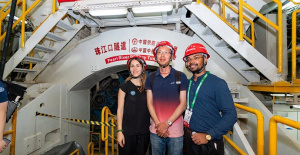 STATEMENT: Intelligent systems used in the construction of the deepest underwater tunnel in China
STATEMENT: Intelligent systems used in the construction of the deepest underwater tunnel in China How Blockchain in being used to shape the future
How Blockchain in being used to shape the future Not just BTC and ETH: Here Are Some More Interesting Coins Worth Focusing on
Not just BTC and ETH: Here Are Some More Interesting Coins Worth Focusing on UPV students build a prototype of a wooden house to move to Equatorial Guinea
UPV students build a prototype of a wooden house to move to Equatorial Guinea The UA opens the call for the Impulso 2024 Awards for the best innovative business initiatives
The UA opens the call for the Impulso 2024 Awards for the best innovative business initiatives ALI, virtual assistant from Alicante, internationally recognized by the OECD
ALI, virtual assistant from Alicante, internationally recognized by the OECD Retrópolis brings the golden age of video games and computing to the UPV
Retrópolis brings the golden age of video games and computing to the UPV A million people demonstrate in France against Macron's pension reform
A million people demonstrate in France against Macron's pension reform Russia launches several missiles against "critical infrastructure" in the city of Zaporizhia
Russia launches several missiles against "critical infrastructure" in the city of Zaporizhia A "procession" remembers the dead of the Calabria shipwreck as bodies continue to wash up on the shore
A "procession" remembers the dead of the Calabria shipwreck as bodies continue to wash up on the shore Prison sentences handed down for three prominent Hong Kong pro-democracy activists
Prison sentences handed down for three prominent Hong Kong pro-democracy activists ETH continues to leave trading platforms, Ethereum balance on exchanges lowest in 3 years
ETH continues to leave trading platforms, Ethereum balance on exchanges lowest in 3 years Investors invest $450 million in Consensys, Ethereum incubator now valued at $7 billion
Investors invest $450 million in Consensys, Ethereum incubator now valued at $7 billion Alchemy Integrates Ethereum L2 Product Starknet to Enhance Web3 Scalability at a Price 100x Lower Than L1 Fees
Alchemy Integrates Ethereum L2 Product Starknet to Enhance Web3 Scalability at a Price 100x Lower Than L1 Fees Mining Report: Bitcoin's Electricity Consumption Declines by 25% in Q1 2022
Mining Report: Bitcoin's Electricity Consumption Declines by 25% in Q1 2022 Oil-to-Bitcoin Mining Firm Crusoe Energy Systems Raised $505 Million
Oil-to-Bitcoin Mining Firm Crusoe Energy Systems Raised $505 Million Microbt reveals the latest Bitcoin mining rigs -- Machines produce up to 126 TH/s with custom 5nm chip design
Microbt reveals the latest Bitcoin mining rigs -- Machines produce up to 126 TH/s with custom 5nm chip design Bitcoin's Mining Difficulty Hits a Lifetime High, With More Than 90% of BTC Supply Issued
Bitcoin's Mining Difficulty Hits a Lifetime High, With More Than 90% of BTC Supply Issued The Biggest Movers are Near, EOS, and RUNE during Friday's Selloff
The Biggest Movers are Near, EOS, and RUNE during Friday's Selloff Global Markets Spooked by a Hawkish Fed and Covid, Stocks and Crypto Gain After Musk Buys Twitter
Global Markets Spooked by a Hawkish Fed and Covid, Stocks and Crypto Gain After Musk Buys Twitter Bitso to offset carbon emissions from the Trading Platform's ERC20, ETH, and BTC Transactions
Bitso to offset carbon emissions from the Trading Platform's ERC20, ETH, and BTC Transactions Draftkings Announces 2022 College Hoops NFT Selection for March Madness
Draftkings Announces 2022 College Hoops NFT Selection for March Madness